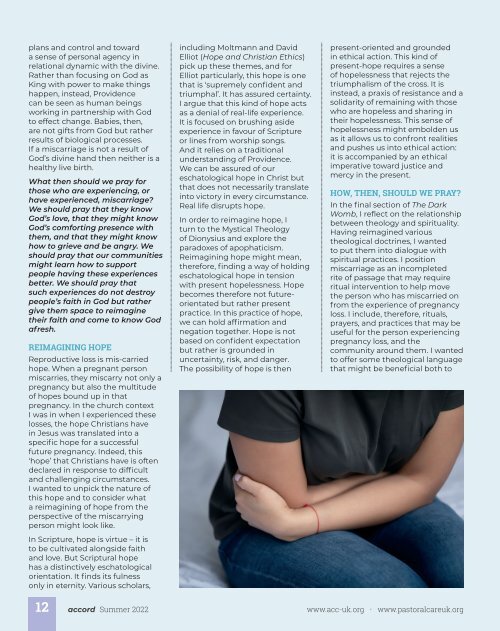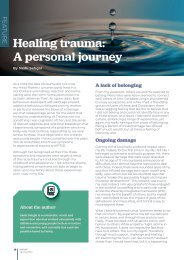ACC E-Accord Summer 2022
You also want an ePaper? Increase the reach of your titles
YUMPU automatically turns print PDFs into web optimized ePapers that Google loves.
plans and control and toward<br />
a sense of personal agency in<br />
relational dynamic with the divine.<br />
Rather than focusing on God as<br />
King with power to make things<br />
happen, instead, Providence<br />
can be seen as human beings<br />
working in partnership with God<br />
to effect change. Babies, then,<br />
are not gifts from God but rather<br />
results of biological processes.<br />
If a miscarriage is not a result of<br />
God’s divine hand then neither is a<br />
healthy live birth.<br />
What then should we pray for<br />
those who are experiencing, or<br />
have experienced, miscarriage?<br />
We should pray that they know<br />
God’s love, that they might know<br />
God’s comforting presence with<br />
them, and that they might know<br />
how to grieve and be angry. We<br />
should pray that our communities<br />
might learn how to support<br />
people having these experiences<br />
better. We should pray that<br />
such experiences do not destroy<br />
people’s faith in God but rather<br />
give them space to reimagine<br />
their faith and come to know God<br />
afresh.<br />
REIMAGINING HOPE<br />
Reproductive loss is mis-carried<br />
hope. When a pregnant person<br />
miscarries, they miscarry not only a<br />
pregnancy but also the multitude<br />
of hopes bound up in that<br />
pregnancy. In the church context<br />
I was in when I experienced these<br />
losses, the hope Christians have<br />
in Jesus was translated into a<br />
specific hope for a successful<br />
future pregnancy. Indeed, this<br />
‘hope’ that Christians have is often<br />
declared in response to difficult<br />
and challenging circumstances.<br />
I wanted to unpick the nature of<br />
this hope and to consider what<br />
a reimagining of hope from the<br />
perspective of the miscarrying<br />
person might look like.<br />
In Scripture, hope is virtue – it is<br />
to be cultivated alongside faith<br />
and love. But Scriptural hope<br />
has a distinctively eschatological<br />
orientation. It finds its fulness<br />
only in eternity. Various scholars,<br />
including Moltmann and David<br />
Elliot (Hope and Christian Ethics)<br />
pick up these themes, and for<br />
Elliot particularly, this hope is one<br />
that is ‘supremely confident and<br />
triumphal’. It has assured certainty.<br />
I argue that this kind of hope acts<br />
as a denial of real-life experience.<br />
It is focused on brushing aside<br />
experience in favour of Scripture<br />
or lines from worship songs.<br />
And it relies on a traditional<br />
understanding of Providence.<br />
We can be assured of our<br />
eschatological hope in Christ but<br />
that does not necessarily translate<br />
into victory in every circumstance.<br />
Real life disrupts hope.<br />
In order to reimagine hope, I<br />
turn to the Mystical Theology<br />
of Dionysius and explore the<br />
paradoxes of apophaticism.<br />
Reimagining hope might mean,<br />
therefore, finding a way of holding<br />
eschatological hope in tension<br />
with present hopelessness. Hope<br />
becomes therefore not futureorientated<br />
but rather present<br />
practice. In this practice of hope,<br />
we can hold affirmation and<br />
negation together. Hope is not<br />
based on confident expectation<br />
but rather is grounded in<br />
uncertainty, risk, and danger.<br />
The possibility of hope is then<br />
present-oriented and grounded<br />
in ethical action. This kind of<br />
present-hope requires a sense<br />
of hopelessness that rejects the<br />
triumphalism of the cross. It is<br />
instead, a praxis of resistance and a<br />
solidarity of remaining with those<br />
who are hopeless and sharing in<br />
their hopelessness. This sense of<br />
hopelessness might embolden us<br />
as it allows us to confront realities<br />
and pushes us into ethical action:<br />
it is accompanied by an ethical<br />
imperative toward justice and<br />
mercy in the present.<br />
HOW, THEN, SHOULD WE PRAY?<br />
In the final section of The Dark<br />
Womb, I reflect on the relationship<br />
between theology and spirituality.<br />
Having reimagined various<br />
theological doctrines, I wanted<br />
to put them into dialogue with<br />
spiritual practices. I position<br />
miscarriage as an incompleted<br />
rite of passage that may require<br />
ritual intervention to help move<br />
the person who has miscarried on<br />
from the experience of pregnancy<br />
loss. I include, therefore, rituals,<br />
prayers, and practices that may be<br />
useful for the person experiencing<br />
pregnancy loss, and the<br />
community around them. I wanted<br />
to offer some theological language<br />
that might be beneficial both to<br />
12 accord <strong>Summer</strong> <strong>2022</strong> www.acc-uk.org • www.pastoralcareuk.org



